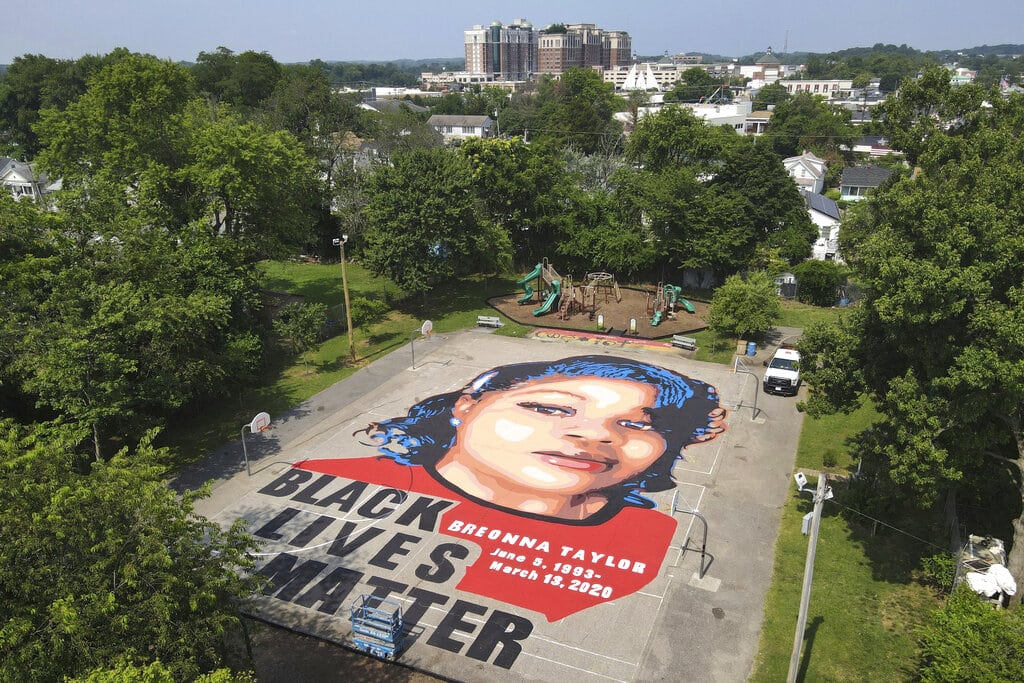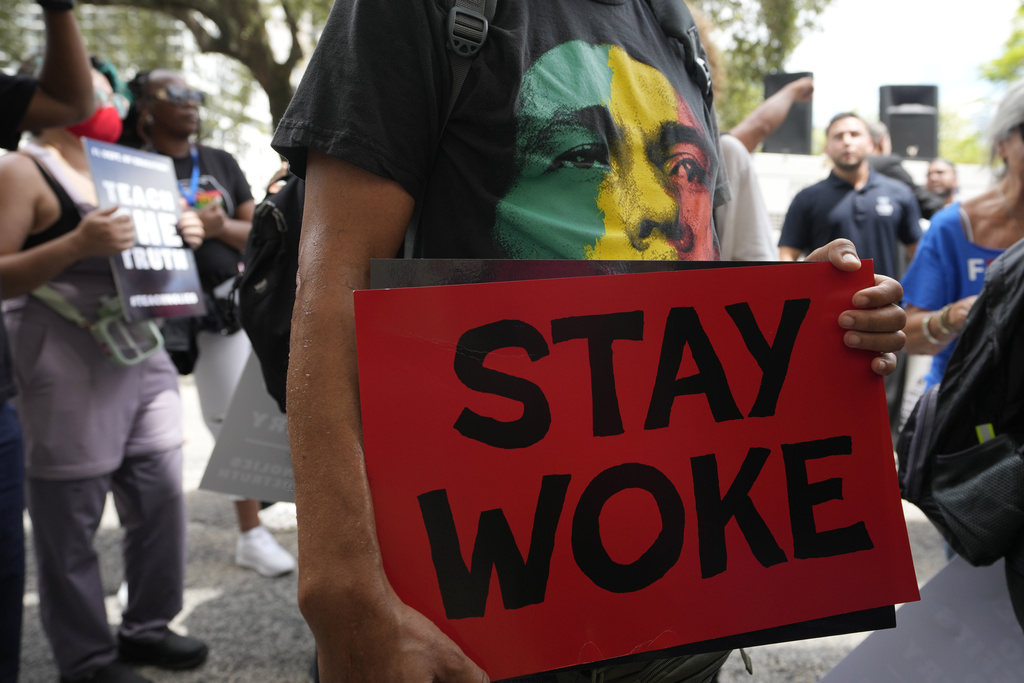“Woke” refers to being aware of the society around you and speaking up for needed change or against perceived injustice. The word suggests someone who has been oblivious to social issues, but then awakens to see the world differently. Tools to effect change would include the First Amendment freedoms of speech, press, petition and assembly.
While “woke” has origins in social awareness, in recent years it has also been adopted as a pejorative political term, often used in the same vein as “cancel culture” and “political correctness.”
A backlash to the "woke movement" began to emerge in 2021, with state laws to remove certain race-based information and ideas in education. And in 2025, President Donald Trump issued two executive orders directly attacking so-called diversity, equity and inclusion, or DEI, practices as discriminatory and ordering them stopped within the federal government. His order led to eliminating certain content about race on federal websites and a notification to schools and colleges that they will lose federal funding if they don't stop DEI activities.
The origins of the phrase 'Stay woke'
The use of “woke" in relation to awareness has its roots in the 20th century, with scholars pointing to its use in Black culture as early as 1938, when folk singer Huddie Ledbetter explained that his song “Scottsboro Boys” was about the need to stay “woke” in Alabama. “I advise everybody to be a little careful when they go down through there,” the performer widely known as “Leadbelly” cautioned. “Just stay woke. Keep your eyes open.”
In 1962, a New York Times article on Black slang was headlined “If You’re Woke You Dig It,” framing the word as an indicator of knowledge and insight.
Mainstream use of the phrase accelerated after the success of Erykah Badu's 2008 song "Master Teacher," with its refrain of “I stay woke.”
'Woke' became associated with modern civil rights movement
Georgia Ann Muldrow wrote the song and explained its origins in a 2018 interview.
“The biggest thing I was trying to communicate is that if the conditions weren’t so daggone oppressive, for everyone, then, of course, I could be aware,” Muldrow told Pitchfork. “It was an ideal.”
“Stay woke” and "woke” became widely associated with the modern civil rights movement.
In adding “woke” to the Merriam-Webster Dictionary in September 2017, the book’s editors noted “Stay woke became a watch word in parts of the Black community for those who were self-aware, questioning the dominant paradigm and striving for something better. But stay woke and woke became part of a wider discussion in 2014, immediately following the shooting of Michael Brown in Ferguson, Missouri.

A ground mural depicting a portrait of Breonna Taylor is seen at Chambers Park, Monday, July 6, 2020, in Annapolis, Md. The mural honors Taylor, a 26-year old Black woman who was fatally shot by police in her Louisville, Kentucky, apartment. The artwork was a team effort by the Banneker-Douglass Museum, the Maryland Commission on African American History and Culture, and Future History Now, a youth organization that focuses on mural projects. (AP Photo/Julio Cortez)
'Woke' became entwined with Black Lives Matter
The word "woke" became entwined with the Black Lives Matter movement; instead of just being a word that signaled awareness of injustice or racial tension, it became a word of action. Activists were "woke" and called on others to "stay woke.”
A 2016 documentary on BET was titled “Stay Woke: The Black Lives Matter Movement.”
On the first anniversary of George Floyd’s March 2020 murder at the hands of a Minneapolis police officer, his brother Terrence called for continued vigilance in fighting racial injustice.
"Stay woke. Don't just open your eyes, stretch, yawn and think that it's over," he said.
Backlash to 'wokeness' seeks to reduce focus on racism
In time, some segments of society derided the use of “woke.”
“It seems it was 10 minutes ago that it was the hot new badge of enlightenment, shared warmly as a kind of lexical bonding ritual, usually in the expression “stay woke,” wrote linguist John McWhorter wrote in the New York Times in 2021. “No more. These days, “woke” is said with a sneer.”
Much of this was fueled by a political backlash from conservatives who decried “wokeness” in connection with the teaching of critical race theory, an academic construct positing that racism in the United States has been reinforced over time by society’s institutions. Teaching of the theory is typically limited to graduate programs on college campuses, but it became the linchpin for state legislative efforts to bar the discussion of race and racism in America’s public schools.
Conservative objections largely centered on concerns that white students exposed to the history of racism in the United States would be made to feel responsible for the discriminatory actions of their forebears.
Florida passes anti-woke legislation
One of the most visible public officials addressing the purported dangers of wokeness was Florida Gov. Ron DeSantis, who said “We will fight the woke in the legislature. We will fight the woke in education. We will fight the woke in the businesses. We will never, ever surrender to the woke mob. Our state is where woke goes to die."
DeSantis proposed state legislation in 2022 to bar schools and workplaces from teaching or training that individuals are “inherently racist, sexist, or oppressive, whether consciously or unconsciously.”
His office characterized it as “a legislative proposal that will give businesses, employees, children and families tools to fight back against woke indoctrination. The Stop W.O.K.E. Act will be the strongest legislation of its kind in the nation and will take on both corporate wokeness and Critical Race Theory. Today’s proposal builds on actions Governor DeSantis has already taken to ban Critical Race Theory and the New York Times’ 1619 project in Florida’s schools.”
The 1619 Project, published by the New York Times beginning in 2019, reported on the history and impact of slavery in America. Its revisionist perspective asserting that America’s real history began with the arrival of the first slave ship in 1619 proved controversial for many.
Judge: Stop Woke Act an attempt to control speech about ideas
The Stop Woke Act was challenged in federal court, leading to an August 2022 injunction from U.S. District Court Judge Mark E. Walker blocking enforcement of the law against businesses. He concluded that the statute was an impermissible limit on the businesses’ speech and in violation of the First Amendment.
“Recently, Florida has seemed like a First Amendment upside down,” Walker wrote in his ruling, referring to a series of laws he saw as burdensome on free speech. “Normally, the First Amendment bars the state from burdening speech, while private actors may burden speech freely. But in Florida, the First Amendment apparently bars private actors from burdening speech, while the state may burden speech freely,” he added.
In March 2024, the 11th US Circuit Court of Appeals upheld Judge Walker’s injunction, with Judge Britt Grant describing the legislation as the “latest attempt to control speech by recharacterizing it as conduct.”
The court found that the law was too vague to be enforced and that it was unconstitutional because it targeted ideas.
“By limiting its restrictions to a list of ideas designated as offensive, the Act targets speech based on its content. And by barring only speech that endorses any of those ideas, it penalizes certain viewpoints — the greatest First Amendment sin,” Grant wrote in his opinion.
Ken Paulson is director of the Free Speech Center at Middle Tennessee State University and former president of the Newseum Institute’s First Amendment Center. He has developed and led several national programs to increase understanding of the First Amendment and its role in society. Paulson is former editor in chief of USA Today and former dean of the College of Media and Entertainment at Middle Tennessee State University.

